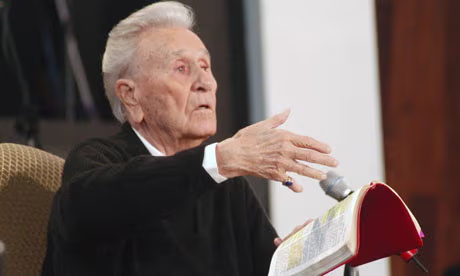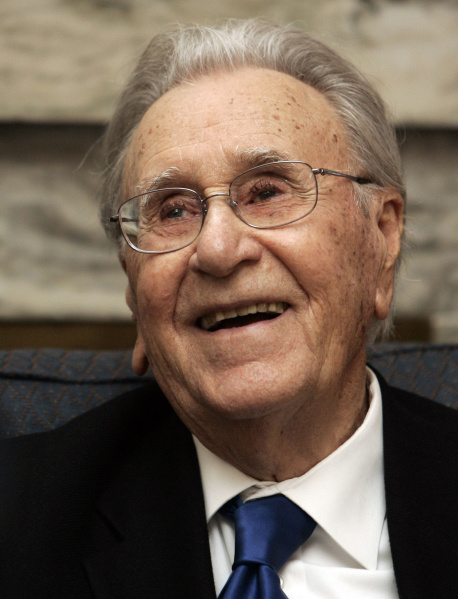Granville Oral Roberts

Granville Oral Roberts (January 24, 1918 – December 15, 2009) was a name synonymous with the rise of charismatic Christianity in the United States. As a televangelist, faith healer, and pioneer of the Prosperity Gospel, Roberts’ career spanned over six decades, making him one of the most recognized and controversial religious leaders of the 20th century. His influence on American Pentecostalism, televangelism, and religious fundraising was profound and continues to be felt today.
Born into poverty in Pontotoc County, Oklahoma, Roberts was the youngest of five children. His father, Reverend Ellis Melvin Roberts, and mother, Claudius Priscilla Roberts, were deeply religious, and Oral’s early life was steeped in faith. Despite his modest beginnings, including nearly dying of tuberculosis at age 17, Roberts' resilience and religious fervour propelled him towards a destiny that he believed was divinely ordained.
After high school, Roberts attended Oklahoma Baptist University and Phillips University but did not complete his degree. In 1938, he married Evelyn Lutman Fahnestock, the daughter of a preacher. His early career as a travelling faith healer began in earnest after he left college. Known for his large mobile tent meetings that could seat thousands, Roberts quickly gained fame. His dramatic healing services, which often featured claims of miraculous cures, drew large crowds and media attention.
Roberts’ ministry took a significant turn in 1945 when he resigned from his pastoral position to hold revivals and pursue his studies at Oklahoma Baptist University. A pivotal moment came when, as he claimed, he opened his Bible to the Third Epistle of John and read verse 2: "I wish above all things that thou mayest prosper and be in health, even as thy soul prospereth." This verse became a cornerstone of his Prosperity Gospel theology. Believing he was divinely directed to heal the sick, he founded the Oral Roberts Evangelistic Association (OREA) in 1947.
Roberts’ healing ministry was marked by his charismatic personality and the dramatic laying on of hands, a method he used to pray for healing. He conducted numerous evangelistic and healing crusades across the United States and internationally, claiming to have prayed personally for over 2 million people. His magazine, Healing Waters, began in 1947, further promoting his message and meetings.
In 1955, Roberts held a "salvation and healing" campaign in Johannesburg, South Africa, during the apartheid era. The campaign drew massive crowds and sparked both criticism and acclaim. Despite the controversy, Roberts left a residual campaign fund intended to continue evangelistic efforts in South Africa, emphasising his commitment to spreading his message globally.
Roberts' influence extended beyond his healing ministry. In 1963, he founded Oral Roberts University (ORU) in Tulsa, Oklahoma, in response to what he described as a divine command. ORU was established with a mission to blend religious faith with academic excellence. The university became known for its strict honour code and the distinctive Prayer Tower at its centre, symbolising its spiritual foundation.
Roberts was a pioneer in televangelism, beginning his radio broadcasts in 1947 and transitioning to television in 1954. His program, The Abundant Life, reached a peak audience in the United States by 1957. His use of media extended his reach far beyond the confines of traditional church settings, allowing him to influence millions. In 1996, he founded Golden Eagle Broadcasting, further cementing his legacy in religious media.
Roberts' teachings on "seed-faith" were particularly influential. This doctrine emphasised the idea that financial contributions to his ministry were like planting seeds that would yield spiritual and material blessings. While this approach drew significant donations, it also attracted criticism for exploiting the hopes and faith of his followers, particularly those from economically disadvantaged backgrounds.
One of the most controversial episodes in Roberts' career was his fundraising drive in 1987, when he claimed that unless he raised $8 million by March, God would "call him home." This dramatic plea led to significant donations, including a notable $1.3 million from Florida dog track owner Jerry Collins, who feared Roberts might die by suicide. Roberts' fundraising tactics often drew scrutiny and were seen by some as manipulative, yet they were undeniably effective.
Roberts' vision of integrating faith with medical science led to the construction of the City of Faith Medical and Research Center in 1981, one of the largest health facilities of its kind at the time. The centre aimed to combine medical treatment with prayer, reflecting Roberts' holistic approach to healing. However, the City of Faith struggled financially and closed in 1989, although some facilities continue to operate.
Roberts' personal life was marked by tragedy and resilience. He was married to Evelyn for 66 years until her death in 2005. They had four children, two of whom died under tragic circumstances. Their daughter Rebecca and her husband died in a plane crash in 1977, and their son Ronald committed suicide in 1982. Despite these personal losses, Roberts remained a steadfast figure in the religious community.
Roberts’ later years were spent in semi-retirement in Newport Beach, California. He continued to be involved in ORU until handing over leadership to Mark Rutland in 2009. He passed away from complications of pneumonia on December 15, 2009, at the age of 91.
Granville Oral Roberts left an indelible mark on American religious life. His pioneering work in televangelism, faith healing, and the Prosperity Gospel transformed the landscape of modern Christianity. While his methods and teachings were often contentious, his influence on the charismatic movement and mainstream acceptance of Pentecostalism is undeniable. His life story reflects the complexities and contradictions of a man who believed deeply in his divine mission, impacting millions through his ministry.




















